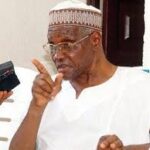The European Union (EU) through its Rule of Law and Anti-Corruption (ROLAC) programme and the Centre for Social Justice (CSJ) have called for the strengthen of the National Anti-corruption Strategy in Nigeria.
Their calls was amidst the case instituted by some state governments at the Supreme Court challenging the constitutionality of the Economic and Financial Crimes Commission (EFCC), Independent Corrupt Practices and Other Related Offences Commission (ICPC) and other anti-corruption agencies.
Executive Director, CSJ, Barrister Eze Onyekpere, said this at the inception meeting of the EU/ROLAC2 Project with the theme, ‘Improving the Effectiveness of Anti-Corruption Processes and Reforms’ on Wednesday in Abuja.
He said that the project, which is aimed at enhancing transparency, especially in government’s administrative processes, will be implemented in the FCT and six focal states of Adamawa, Edo, Anambra, Kano, Lagos and Plateau states.
“The goal of the project is to contribute to increased effectiveness of anti-corruption laws, policies, and strategies for the entrenchment of reforms at national and subnational levels, leading to enhanced implementation and compliance with anti-corruption laws.
“Anti-corruption laws and policies are not an end in themselves but they are expected to lead to systemic change, enhanced compliance and behavioural change in society, making it possible for increased prevention of corruption, corrective action in individual cases, detection and prosecution of offenders and to make more difficult, future breaches of the law.
“In the long term, resources which have been diverted due to corruption will be released for poverty reduction and the implementation of the Sustainable Development Goals, SDGs,” Onyekpere said.
He said the programme will run for two years dealing issues of audit, fiscal responsibility, code of conduct, ICPC, and media partnerships to evolve workable and sustainable strategies.
Acting Chairman, Code of Conduct Bureau (CCB), Barrister Murtala Kankia, said that corruption remains one of the most pervasive challenges that continues to impede progress in the nation, as it weakens institutions, undermines the rule of law, and stifles economic development.
“At CCB, we are committed to upholding the highest standards of integrity within the public service, and we believe that collaboration is key to making meaningful strides in the fight against corruption,” Kankia said.
Executive Chairman Fiscal Responsibility Commission, Victor Muruako, represented by the Head of Policy and Standard Directorate, Ado Hassan, said that, the establishment of the FRC, pursuant to the Fiscal Responsibility Act (FRA) of 2007, underscores Nigeria’s commitment to fostering accountability, transparency, and prudence in its fiscal and financial operations.
He said, “Pursuant to the provisions of Section 54 of the FRA 2007, the FRC continues to sensitize and encourage State Governments in the Federation to domesticate the Fiscal Responsibility Act and establish agencies to drive the implementation of these laws at the sub-national level.”
The program is expected to be implemented over a duration of 24 months.
 Join Daily Trust WhatsApp Community For Quick Access To News and Happenings Around You.
Join Daily Trust WhatsApp Community For Quick Access To News and Happenings Around You.


